By @carlossanchezp - 2016 - ConferenciaRoR
Bulk load data with
ActiveRecord and NoSQL
The only card I need is .......The Ace Of Spades
Carlos Sánchez Pérez

Pragmatic developer, Ruby/Rails choice at the moment, Learning Scala, Elixir/Phoenix & DDD. Currently working as Web Dev at @The_Cocktail.
Let's make it happen
Blog (only in spanish):
carlossanchezperez.wordpress.com
Twitter:
Based on Real projects with Ruby On Rails
My experience
1.-Project called Searcher:
Bulk load 300k per week
- File CSV data
- Active Record
- Medium Traffic Volume
- Create
- Update
- Delete
- MySQL - 300k
- Thinking Sphinx full-text search tool
2.-Project called E-commerce
Bulk load 300k per day
- Connection with external services
- Hight Traffic Volume
- Create
- Update
- Logical deletion products
- CouchDB - 1M products
- Search tool ElasticSearch
Overview
1.-Project called Searcher:
- Architecture
- Models
- My First solution - Arrays
- Mistakes lead to good things
- Tips & Ideas
- With & without Active Record
2.-Project called E-commerce
- Architecture
- Real time
- Document design - NoSQL
- Superimpose processes
- Data load & synchronization
4.-Conclusions
RoadMap
3.-Logs & the power of information
1.-Project Searcher
Data load with Active Record
1.1-Architecture
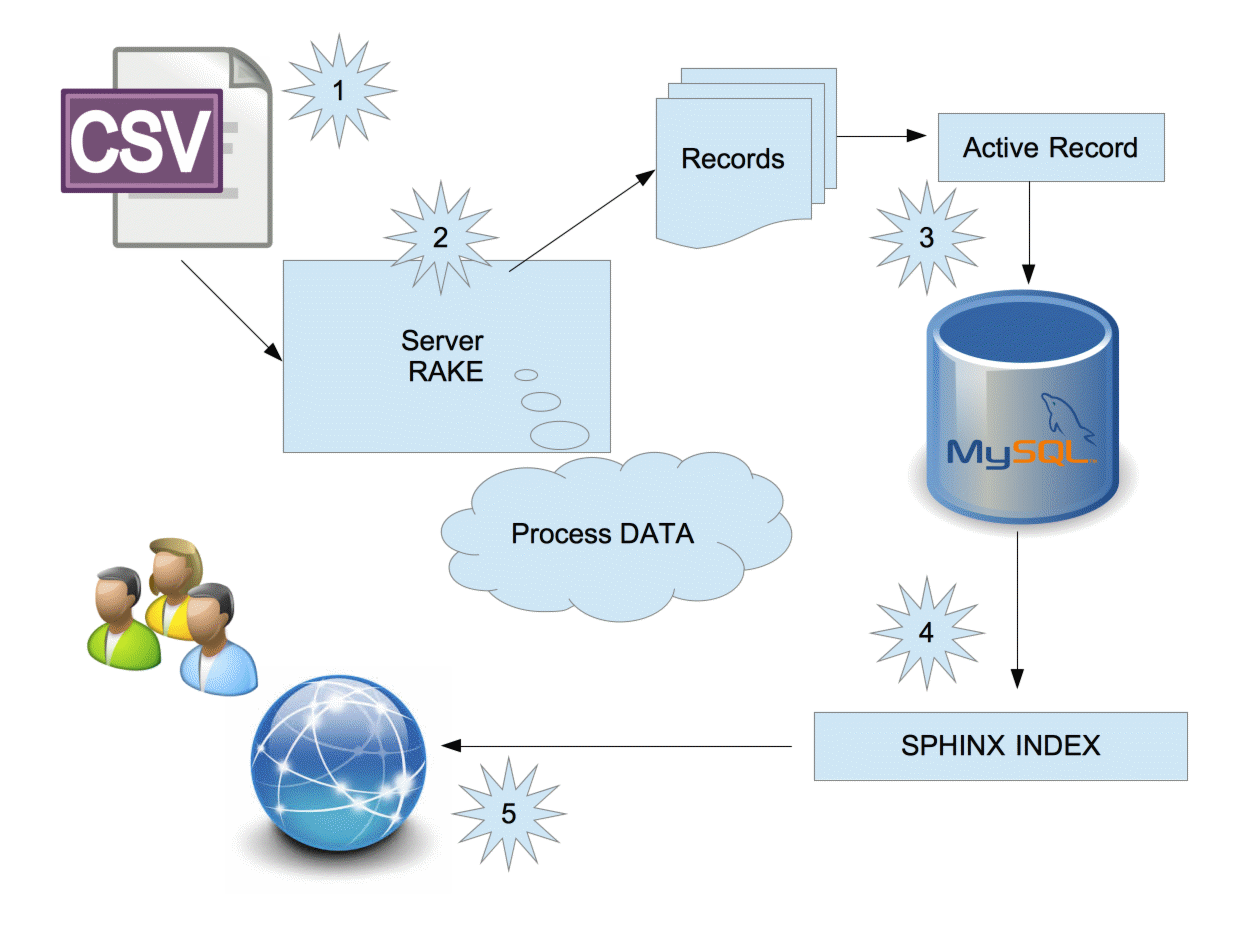
ARCHITECTURE
1.2- Models
Main Models
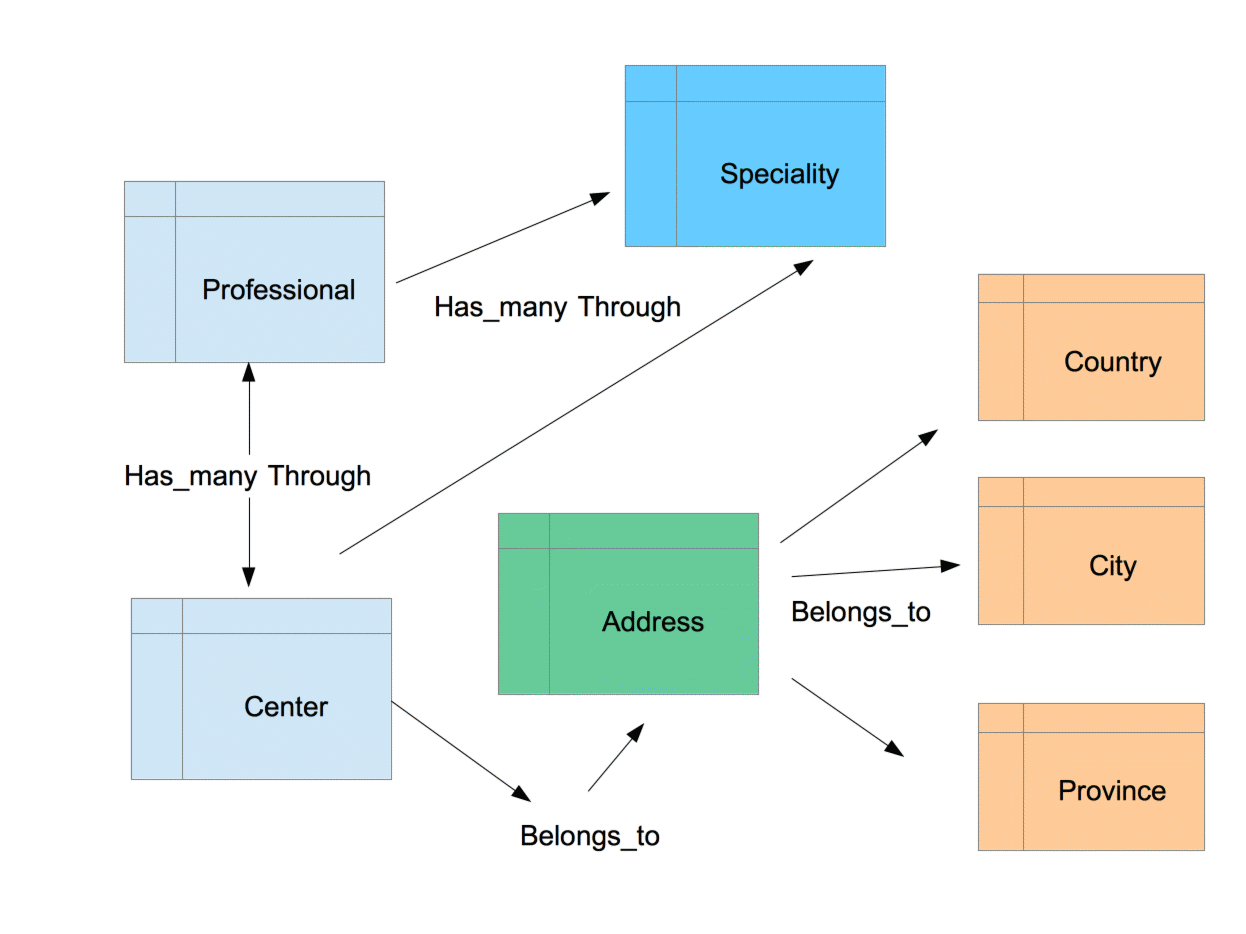
1.3- My First Solution
Arrays & Performance
First Solution - Arrays
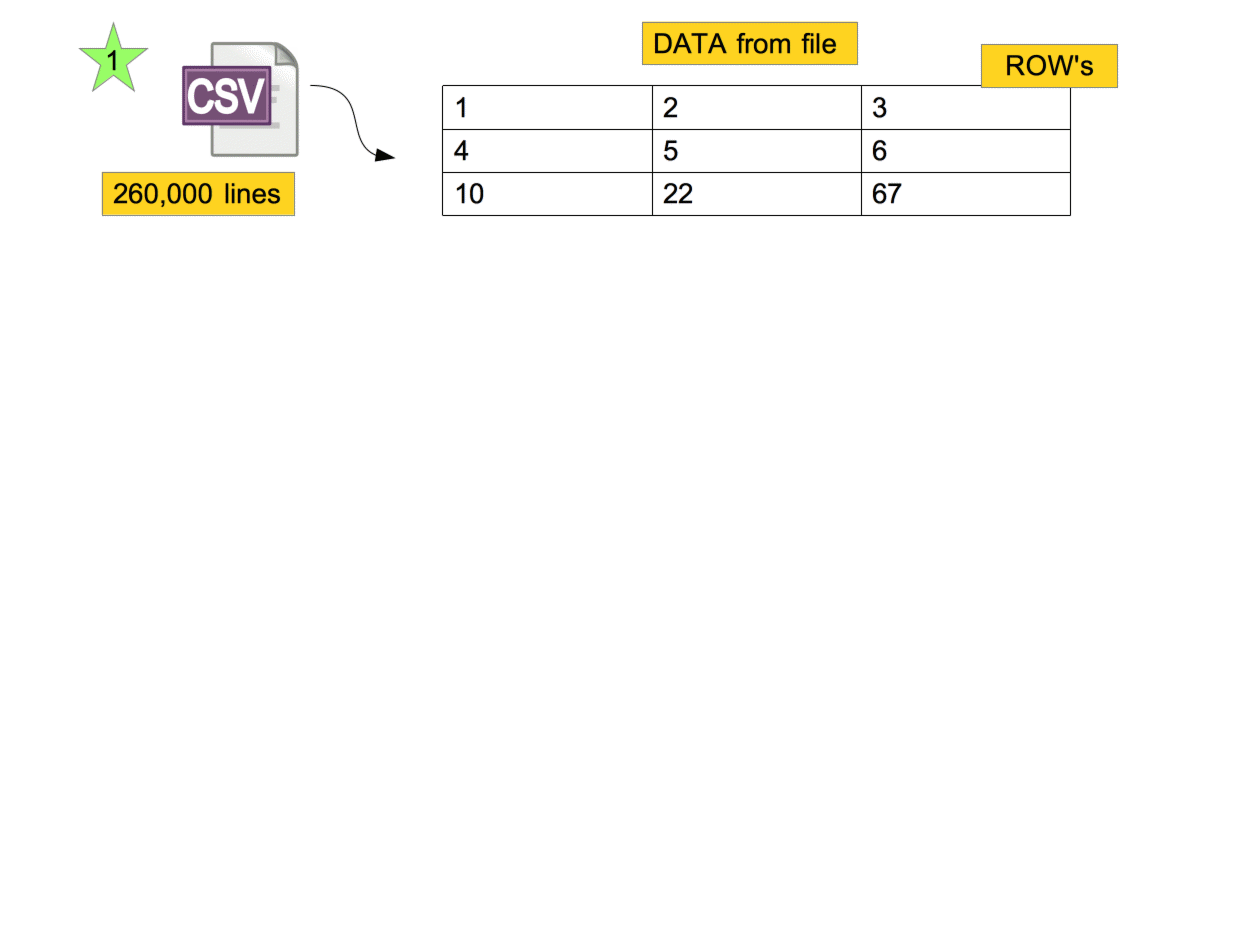
First Solution - Arrays
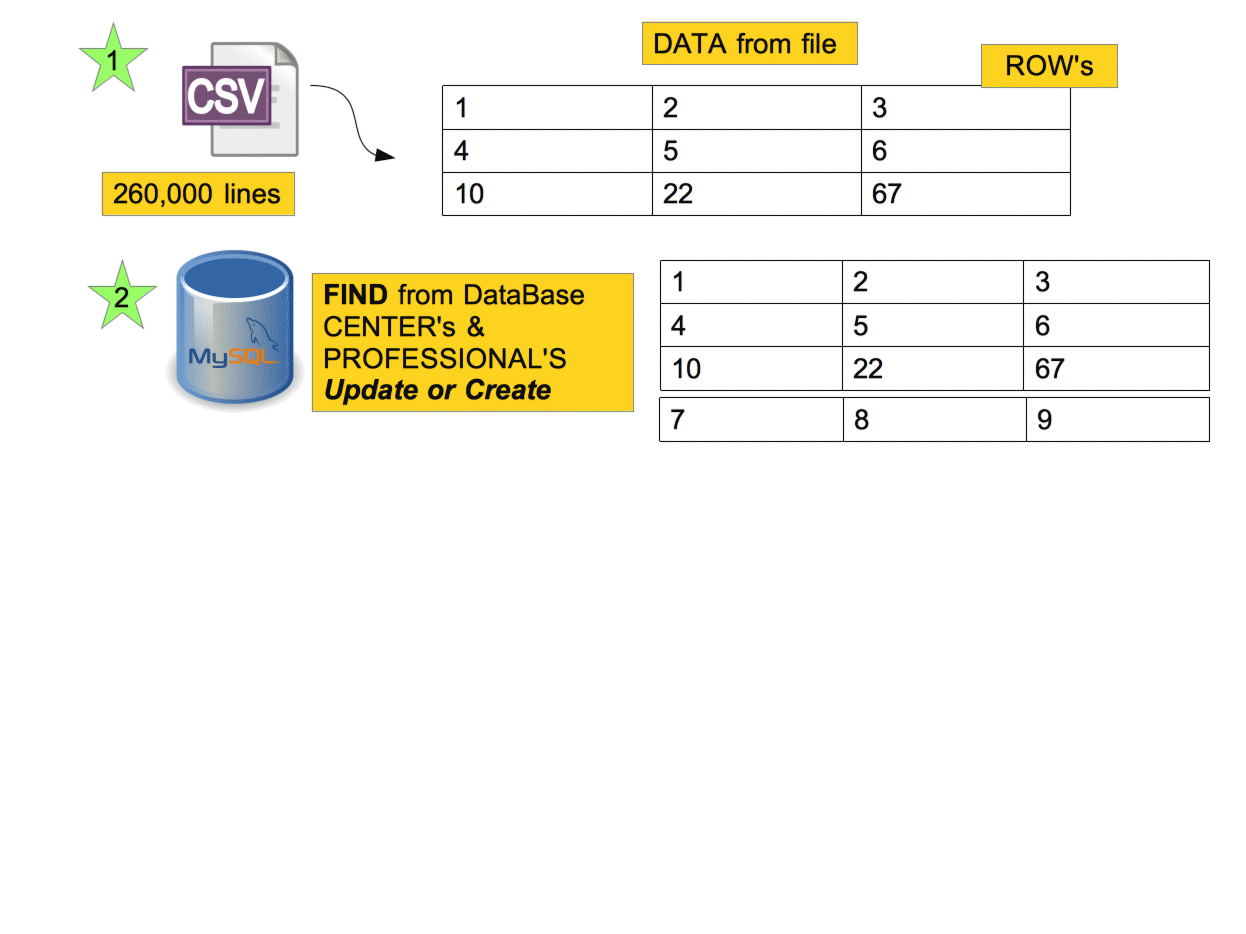
First Solution - Arrays
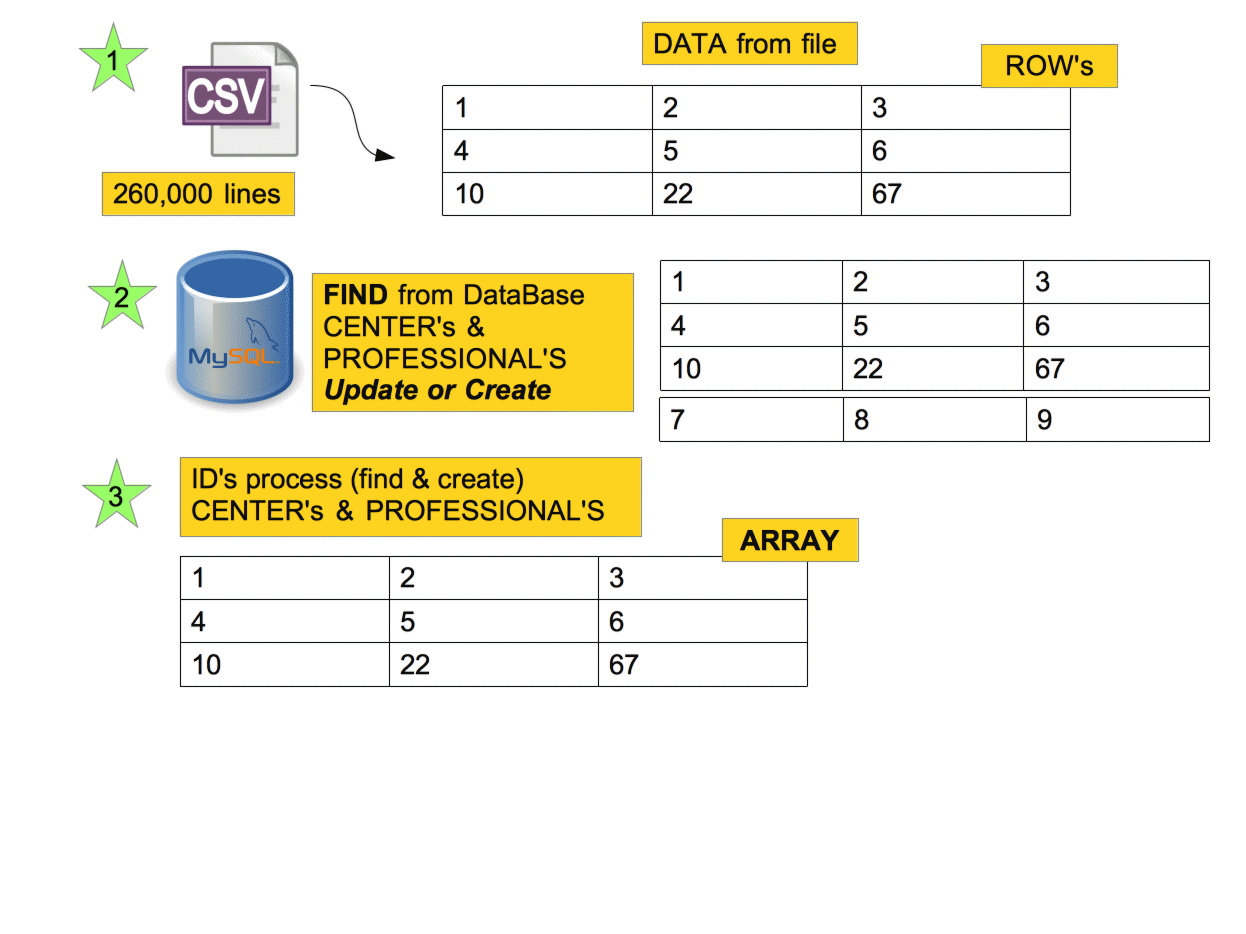
First Solution - Arrays
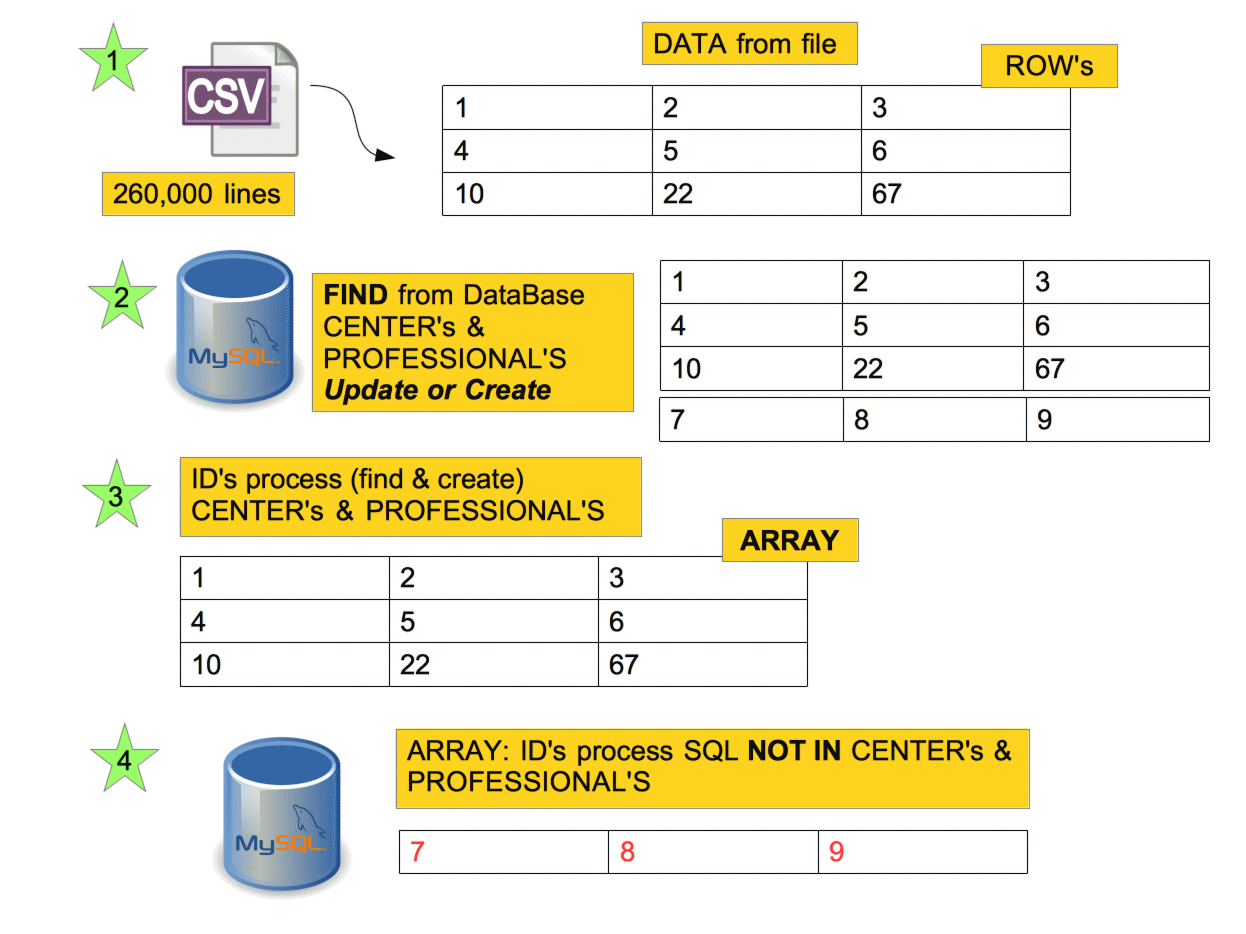
Solution method

It takes a LOT of time
1) Penalized performance with "not in" with a big array (a lot of elements)
2) "uniq" because we can have duplicated elements in the array
3) "map" because we only need ID's to destroy them
The reason why
AR suffers a lot with this solution
We realised we had to go over all these things:
- Bad performance
- CSV file was read 3 times
- Big arrays with ID's processed data & "not in" SQL
- Several SQL "SELECT" where executed per CSV line
End process time was:
24 - 28 hours for 300,000 lines CSV file
1.4- Mistakes Lead To Good things
what happens if i change the way of doing things
Remember
Quick idea
- Read file CVS
- Professional ID's processed into Array
- Delete method with "not processed" using "not in"
- More than 24h to finish
- A lot SQL for the same model per line read
1.4.1.Refactoring
Re-Thinking load process
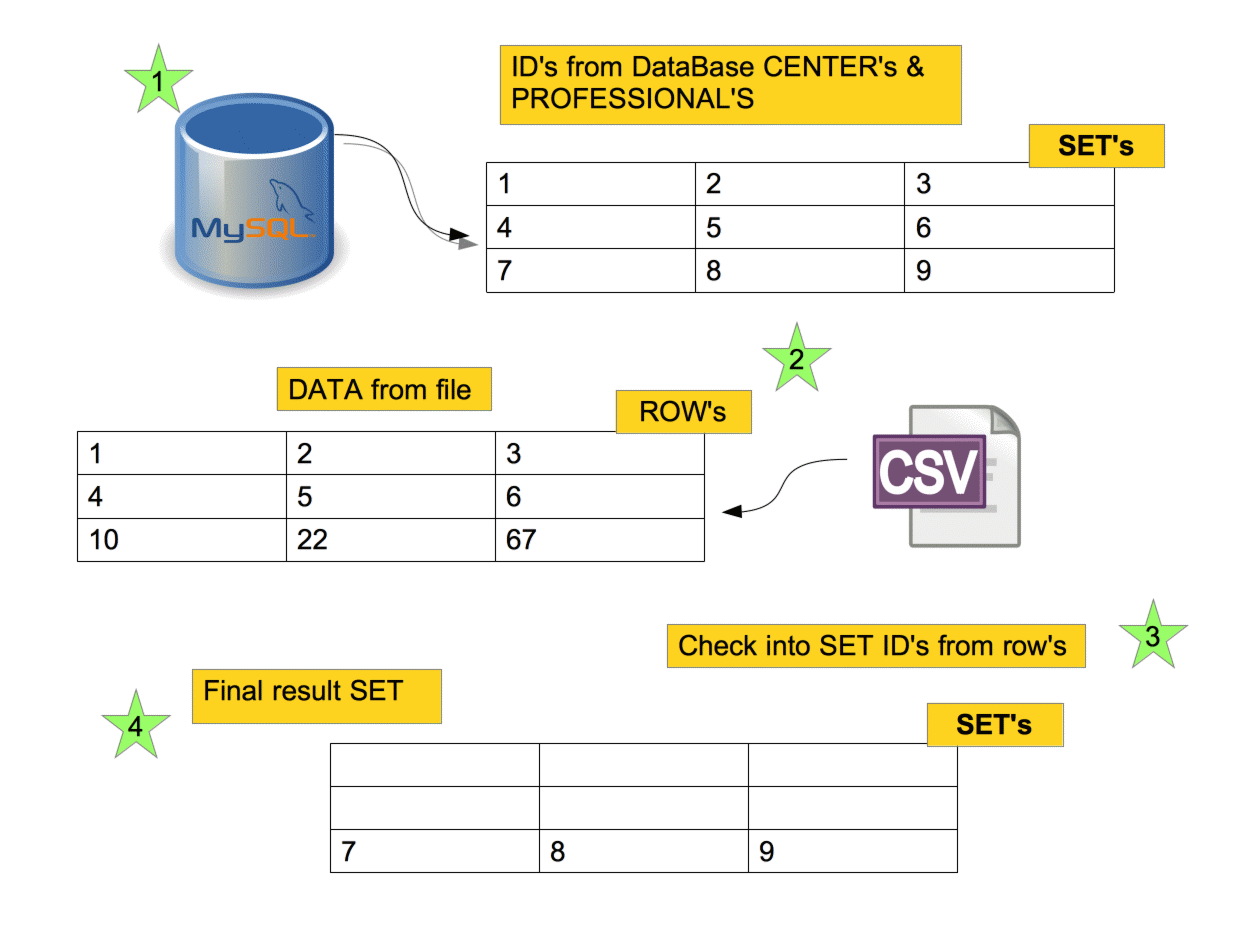
def process_file
set_ids_centers = Set.new get_ids_centers
set_ids_professionals = Set.new get_ids_professionalsSet with ID's
# ID's with SET
pop_ids(@set_ids_centers,center.id)
pop_ids(@set_ids_professionals,professional.id)
# Pops ID's to delete at the end
def pop_ids(ids, id)
ids.delete(id) if ids.include? id
end
Check ID's from file into SET
# Unprocessed ID's
def delete_unprocessed_ids(ids_centers,ids_professionals)
Professional.destroy(ids_professionals.to_a) if ids_professionals
Center.destroy(ids_centers.to_a) if ids_centers
endDelete ID's from SET
It's much faster
Less time consuming
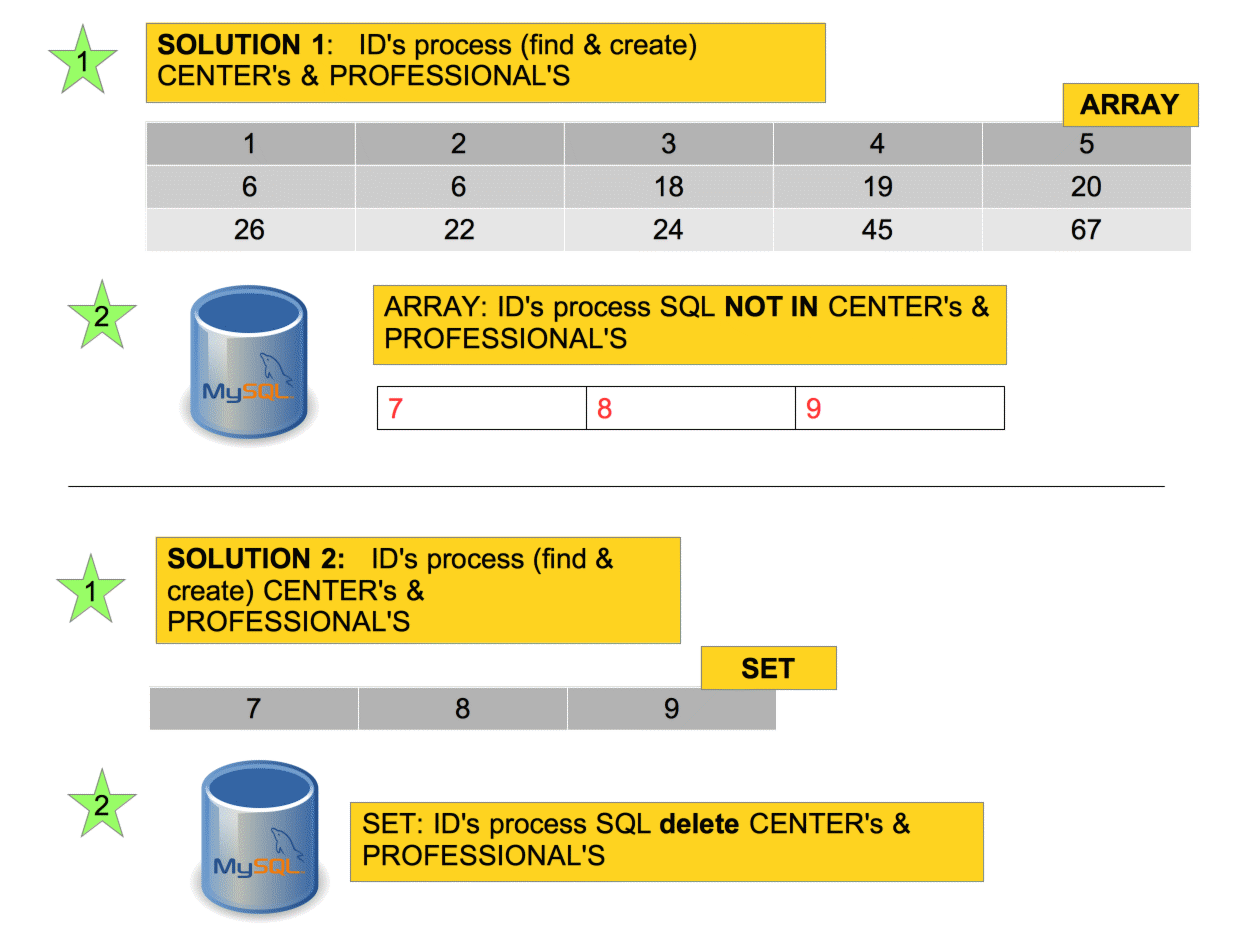

We are getting better...
1.4.2- Tips & Ideas
1.4.2.1-Set vs Array
The reason why
Benchmark.bm do |x|
x.report "Set" do
a=Set.new
1000.times{a.add(rand(100))}
end
x.report "Array" do
a=[]
1000.times{r=rand(100);a<<r unless a.include?(r)}
end
end
user system total real
Set 0.000000 0.000000 0.000000 ( 0.001127)
Array 0.000000 0.000000 0.000000 ( 0.000829)
Array vs Set
Benchmark.bm do |x|
x.report "Set" do
a=Set.new
1000.times{a.add(rand(1000))}
end
x.report "Array" do
a=[]
1000.times{r=rand(1000);a<<r unless a.include?(r)}
end
end
user system total real
Set 0.000000 0.000000 0.000000 ( 0.003271)
Array 0.000000 0.000000 0.000000 ( 0.003250)Array vs Set
Benchmark.bm do |x|
x.report "Set" do
a=Set.new
1000.times{a.add(rand(10000))}
end
x.report "Array" do
a=[]
1000.times{r=rand(10000);a<<r unless a.include?(r)}
end
end
user system total real
Set 0.000000 0.000000 0.000000 ( 0.001240)
Array 0.010000 0.000000 0.010000 ( 0.010081)
user system total real
Set 0.000000 0.000000 0.000000 ( 0.001545)
Array 0.010000 0.010000 0.020000 ( 0.008941)Array vs Set
the best way that can i use both of them
1) With a small number of elements is much better Array
2) With a large number of elements is much better Set
1.4.2.2.-Pluck vs Map
users = User.all
=> [#<User id: 1, email: 'csanchez@example.com', active: true>,
#<User id: 2, email: 'cperez@example.com', active: false>]
users.map(&:email)
=> ['csanchez@example.com', 'cperez@example.com']
# always i use: User.all.map(&:email)
emails = User.select(:email)
=> [#<User email: 'csanchez@example.com'>, #<User email: 'cperez@example.com'>]
emails.map(&:email)
=> ['csanchez@example.com', 'cperez@example.com']
User.pluck(:email)
=> ['csanchez@example.com', 'cperez@example.com']
User.where(active:true).pluck(:email)Pluck vs Map - examples
ActiveRecord::Base.logger.level = 1
n = 1000
Benchmark.bm do |x|
x.report('Country.all.map(&:name): ') { n.times { Country.all.map(&:name) } }
x.report('Coutry.pluck(:name): ') { n.times { Country.pluck(:name) } }
end
## Score
user system total real
Country.all.map(&:name): 3.830000 0.140000 3.970000 ( 4.328655)
Coutry.pluck(:name): 1.550000 0.040000 1.590000 ( 1.879490)Benchmark Pluck vs map
# How to load
set_ids_centers = Set.new get_ids_centers
set_ids_professionals = Set.new get_ids_professionals
# Method only return id's
def get_ids_centers
Center.pluck(:id)
end
def get_ids_professionals
Professional.pluck(:id)
endLoad element into SET
1.4.2.3-We need validations
Do we need model validations all along the load process?
create_table "professionals", force: true do |t|
t.string "email", null: false
t.string "first_name", null: false
t.string "last_name", null: false
t.string "personal_web", default: "http://"
t.string "telephone"
t.boolean "show_telephone", default: true, null: false
t.boolean "show_email", default: true, null: false
t.text "cv"
t.integer "update_check", default: 0
t.boolean "delta", default: true, null: false
t.integer "type_id", default: 0, null: false
t.string "languages"
t.string "twitter"
t.string "numbercol", limit: 30
t.boolean "active", default: true, null: falseValidate - Data Base
class Professional < ActiveRecord::Base
include NestedAttributeList, FriendlyId
# Attributes
friendly_id :full_name, use: :slugged
# Validations
validates :email, uniqueness: true, case_sensitive: false, allow_blank: true
validate :first_name, present: true
validate :last_name, present: true
validate :type_id, present: true
Validate - Models
If i use these:
- Cache Model
- Model polymorphic
the answer was..... "not always"
Skip presence validations while loading.....
and delegate to DB validations
def skip_validations
# Skip presence validations while loading, and delegate to DB validations
skip_presence_validation(Address, :country)
skip_presence_validation(Address, :province)
skip_presence_validation(Address, :city)
skip_presence_validation(Skill, :professional)
skip_presence_validation(SpecialitySpecialist, :speciality)
skip_presence_validation(SpecialitySpecialist, :specialist)
skip_presence_validation(ProfessionalCenter, :professional)
skip_presence_validation(ProfessionalCenter, :center)
skip_presence_validation(InsuranceCompanyPartner, :insurance_company)
skip_presence_validation(InsuranceCompanyPartner, :partner)
endDelegate to BBDD
def skip_presence_validation(model_class, field)
validators = model_class._validators[field]
validators.reject! do |validator|
validator.is_a?(ActiveRecord::Validations::PresenceValidator)
end
model_class._validators.delete(field) if validators.empty?
empty_callbacks = []
callbacks = model_class._validate_callbacks
callbacks.each do |callback|
if callback.name == :validate && callback.filter.is_a?(ActiveRecord::Validations::PresenceValidator) && callback.filter.attributes.include?(field)
callback.filter.attributes.delete(field)
empty_callbacks << callback if callback.filter.attributes.empty?
end
end
empty_callbacks.each {|c| callbacks.delete(c) }
endDelegate to BBDD
class Address < ActiveRecord::Base
# Relations
belongs_to :country, inverse_of: :addresses
belongs_to :city, inverse_of: :addresses
belongs_to :province, inverse_of: :addresses
has_many :centers, inverse_of: :address
# Validations
validates :country, :city, :province, presence: true
validates :name, presence: true
# Delegations
delegate :name, :code, to: :country, prefix: true, allow_nil: true
delegate :name, to: :city, prefix: true, allow_nil: true
delegate :name, to: :province, prefix: true, allow_nil: true
endDelegate to BBDD
class SpecialitySpecialist < ActiveRecord::Base
# Relations
belongs_to :speciality, inverse_of: :speciality_specialists
belongs_to :specialist, polymorphic: true
# Validations
validates :speciality, presence: true
validates :specialist, presence: true
endDelegate to BBDD
Less time consuming
1.4.2.4-Cache models
4 select AR per line reading - file

def cached_tables
{
cities: City.all.index_by {
|c| "#{c.province_id}-#{c.external_id}" },
provinces: Province.all.index_by(&:external_id),
countries: Country.all.index_by(&:external_id),
specialities: Speciality.all.index_by(&:external_id),
insurance_companies: InsuranceCompany.all.to_a,
}
endCached tables - Hash
def cities
@caches[:cities]
end
def provinces
@caches[:provinces]
end
def countries
@caches[:countries]
end
def specialities
@caches[:specialities]
end
def insurance_companies
@caches[:insurance_companies]
endCached tables - Method
def find_or_create_city(province, country)
city = cities["#{province.id}-#{row.city_attributes[:external_id]}"]
|| City.new
city.attributes = row.city_attributes.
merge(province: province, country: country)
city.save! if city.changed?
cities["#{city.province_id}-#{city.external_id}"] = city
city
endMethod
Less time consuming
1.5-Result of this ideas and tips
Score
- Time process more or less 4 hours
- 400,000 AR select less
- Code was more readable

1.6-With & without ActiveRecord
TIMES = 10000
def do_inserts
TIMES.times { User.create(:user_id => 1, :sku => 12, :delta => 1) }
end
Benchmark.measure { ActiveRecord::Base.transaction { do_inserts } }
Benchmark.measure { do_inserts }
CODE
CONN = ActiveRecord::Base.connection
TIMES = 10000
def raw_sql
TIMES.times { CONN.execute "INSERT INTO `user`
(`delta`, `updated_at`, `sku`, `user_id`)
VALUES(1, '2015-11-21 20:21:13', 12, 1)" }
end
Benchmark.measure { ActiveRecord::Base.transaction { raw_sql } }
Benchmark.measure { raw_sql }
CODE
CONN = ActiveRecord::Base.connection
TIMES = 10000
def mass_insert
inserts = []
TIMES.times do
inserts.push "(1, '2015-11-21 20:21:13', 12, 1)"
end
sql = "INSERT INTO user (`delta`, `updated_at`, `sku`,
`user_id`)
VALUES #{inserts.join(", ")}"
CONN.execute sql
end
Benchmark.measure { mass_insert }CODE
ActiveRecord without transaction:
14.930000 0.640000 15.570000 ( 18.898352)
ActiveRecord with transaction:
13.420000 0.310000 13.730000 ( 14.619136)
1.29x faster than base
Raw SQL without transaction:
0.920000 0.170000 1.090000 ( 3.731032)
5.07x faster than base
Raw SQL with transaction:
0.870000 0.150000 1.020000 ( 1.648834)
11.46x faster than base
Only Mass Insert:
0.000000 0.000000 0.000000 ( 0.268634)
70.35x faster than baseScore
Remember, knowledge, benchmark and refactoring
2.Project E-Commerce
Real time load data
2.1-Architecture
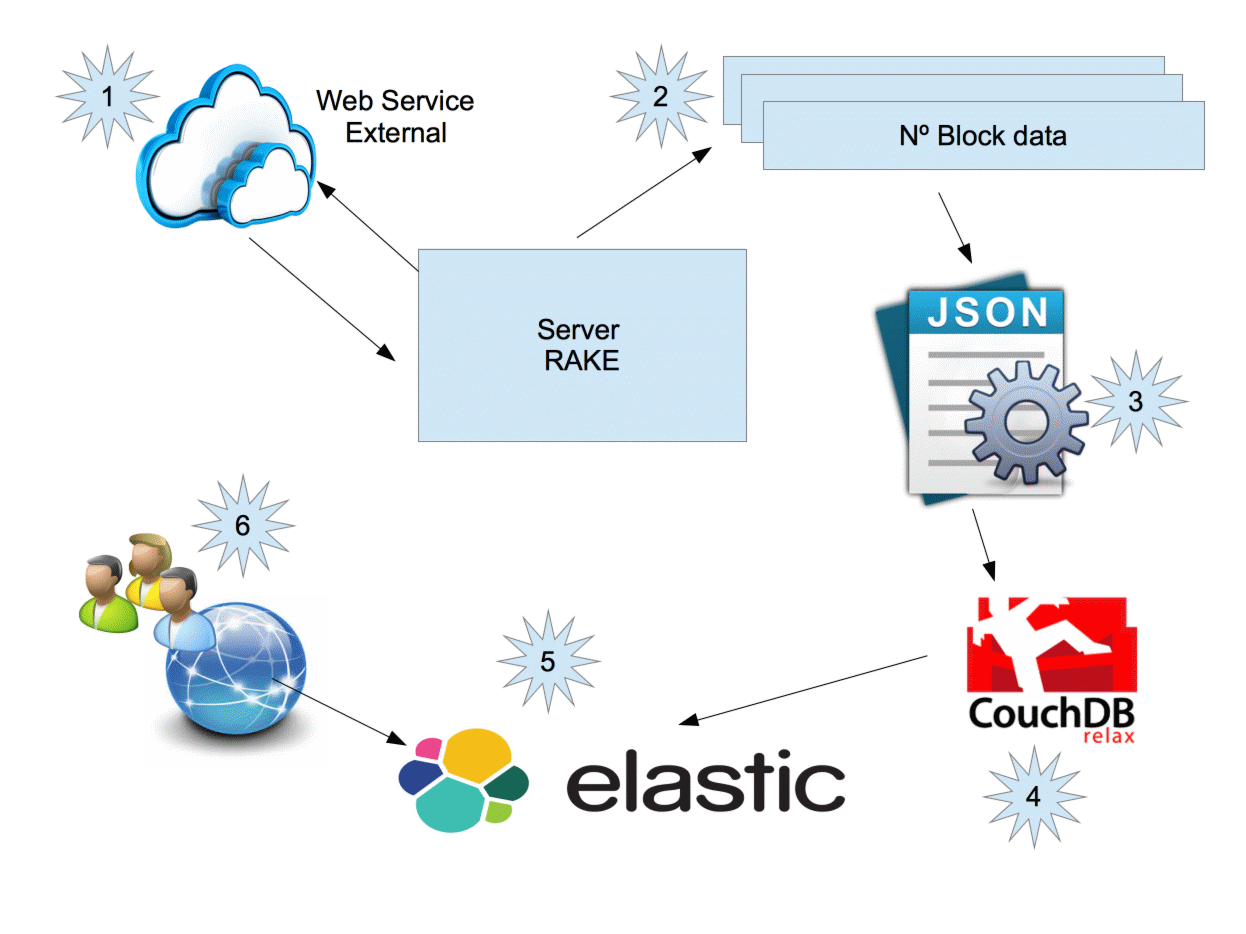
Architecture
2.2.Real Time

Frontend
Provider 1
Provider 2
2.3.Document design - NoSQL
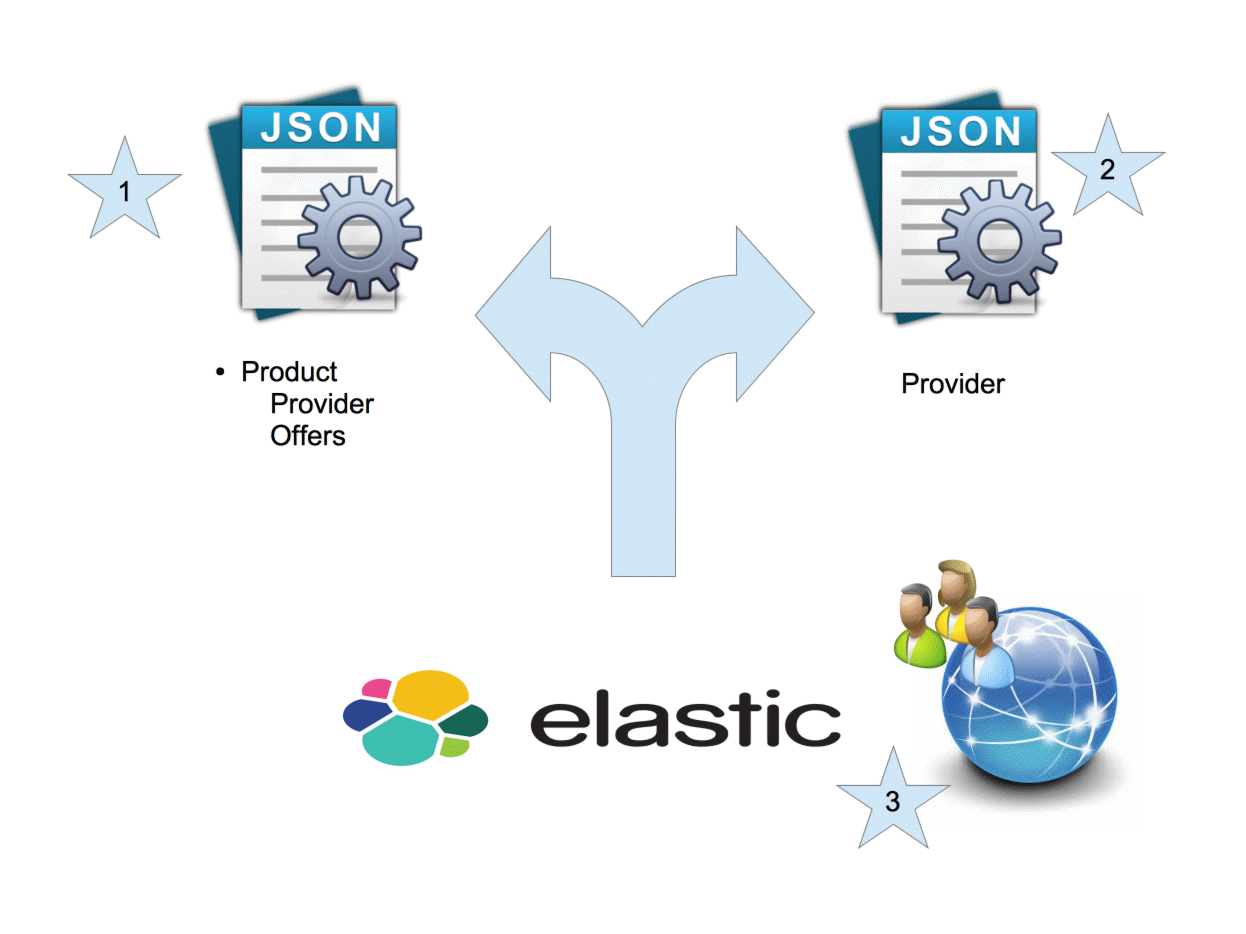
Documents
2.4.Process Time & Superimpose process
*/30 * * * * flock -n /tmp/cron.txt.lock sh -c 'cd /var/www/project/current && bundle exec rake load:parse' || sh -c 'echo MyProject already running; ps; ls /tmp/*.lock'
crontab S.O.
2.5-Data load & synchronization
Sync CouchDB & Elastic
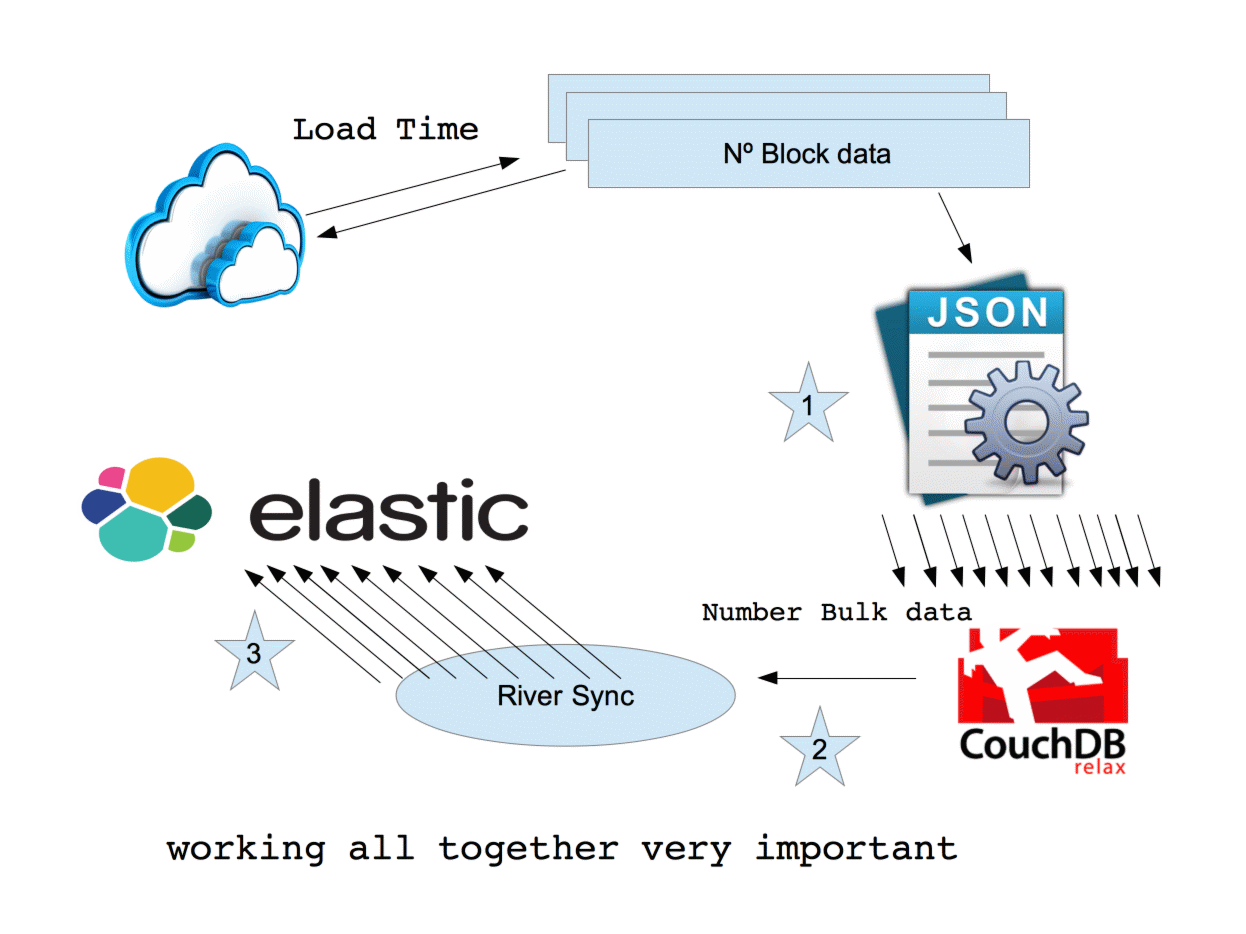
3- LOGS & The power of information
- How many items have been loaded?
- How many errors have you had?
- How many elements with a specific class have been loaded?
- How many items have been removed / changed?
- How many items did not meet load conditions?
- .....
Logs should answer questions like these:
feeds logs
logs with information
LOG data
- Transaction ID
- Time of Web Services
- Differents Logs
- We need to store more info at the beginning of the project
# warnings, errors o info
Rails.logger.warn "cuidado no dispone de...."
Rails.logger.error "Error en..."
Rails.logger.info "RESPONSE TOKEN: #{token_info["access_token"]}"
# way to use
Rails.logger.tagged "MYPROJECT" do
Rails.logger.tagged "GET_OFFERS_BY_BLOCK" do
end
endRails logger
4. Conclusion
Final summary
- The more ActiveRecord you know, the better
- Things to take into consideration: speed, amount of data, real time or not real time and the architecture components
- Design of your documents and Models
- Cache as much as possible
- Re-think everything and refactor
- The power of Logging
and especially ... it's very very important
share your experiences
That's all Folks!!
By @carlossanchezp - 2016 - ConferenciaRoR